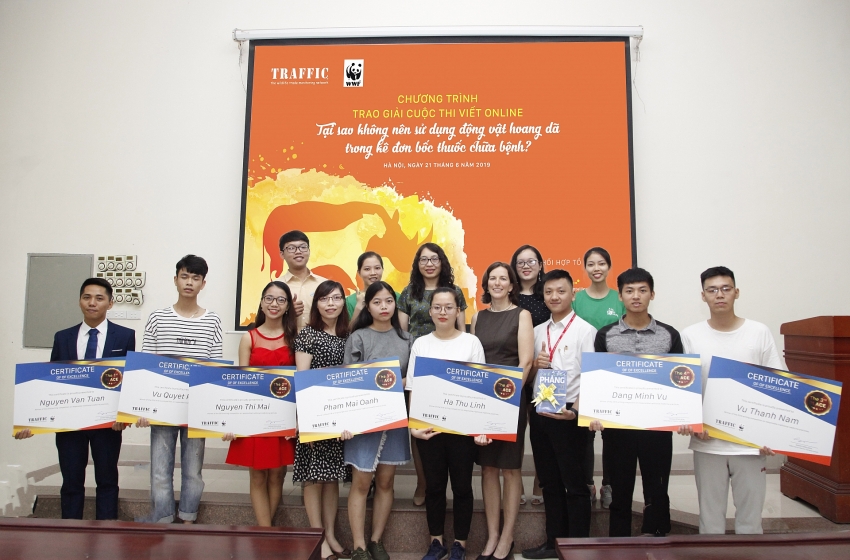The winners of TRAFFIC sustainable traditional medicine competition
 |
| The competition was organised by TRAFFIC in partnership with WWF Germany, Intelligent Media, and Hanoi Medical University |
The competition, organised by TRAFFIC in partnership with WWF Germany, behaviour change communication agency Intelligent Media, and Hanoi Medical University sought to encourage ideas on sustainable, legal alternatives to illegal wildlife products in traditional medicine in Vietnam.
Three entrants – Vo Thi Anh Tuyet, Ngo Mai Thi Thanh Huyen, and Nguyen Van Tuan – beat 62 other university and college students to win first prizes for their essays. The winning entries featured ideas on plant-based alternatives to rhino horn and other illegal wildlife products and reflected on the importance of protecting biodiversity – both for the future of the traditional medicine sector and the future of the planet. Finalists also noted the detrimental effect that poaching has on local communities and the necessity of abiding by the law.
The majority of entrants were traditional medicine students, perhaps indicating a shift in attitude towards the acceptability of these products in a sector that still has links to the use of products from endangered species, such as rhino horn, pangolin scales, and tiger bones, despite their use being banned. So far this year, more than 40 tonnes of pangolin scales have been seized either in Vietnam or en route to the country.
“We are glad to see students showing a growing interest in the conservation of the environment, biodiversity, and wildlife species through this contest. It is of the utmost importance that we all raise their voices to eliminate the use of endangered wild species in traditional medicine,” said Dao Anh Son from Hanoi Medical University's Department of Training, Research and International Cooperation.
Winners were chosen based on the clarity of their arguments and the strength of their writing. As part of the competition requirements, all entries have been circulated widely on Facebook, sharing their ideas on sustainability with hundreds of others. The winning entries will additionally be translated into English and promoted by TRAFFIC.
In 2018, also with funding from WWF Germany, TRAFFIC held a series of workshops with traditional medicine students, offering guidance on sustainable alternatives to illegal wildlife products. Following the workshops, 85 per cent of students stated that they would not recommend illegal wildlife products, compared with an initial 68 per cent.
“We aim to empower future traditional medicine practitioners to seek out legal, sustainably sourced products. This work contributes to efforts tackling the global threat posed by the illegal wildlife trade and provides ways for the traditional medicine community proactively to protect endangered species,” said Sarah Ferguson, TRAFFIC’s Vietnam director.
| List of competition winners First place: 1.Vo Thi Anh Tuyet, Hanoi Medical University 2. Ngo Mai Thi Thanh Huyen, Pham Ngoc Thach Medical University, Ho Chi Minh City 3. Nguyen Van Tuan, Hanoi Medical University Second place: 1. Nguyen Thi Mai, Hai Duong Medical Technical University 2. Nguyen Thi Kim Lien, University of Economics and Industrial Technology 3.Vu Quyet Phu, Hanoi Medical College Third place: 1. Pham Ngoc Dan Anh, Vietnam Maritime University 2. Vu Thanh Nam, FPT University 3. Pham Mai Oanh, Hanoi Medical University Fourth place: 1.Ha Thi Thu Linh, Hanoi Medical University 2. Dang Minh Vu, Thuy Loi University |
What the stars mean:
★ Poor ★ ★ Promising ★★★ Good ★★★★ Very good ★★★★★ Exceptional
Related Contents
Latest News
More News
- Nestlé Vietnam's Lunar New Year campaign reframes how Tet is counted (January 28, 2026 | 11:40)
- Tet event in Japan celebrates success of 14th National Party Congress (January 25, 2026 | 10:04)
- 14th National Party Congress wraps up with success (January 25, 2026 | 09:49)
- Congratulations from VFF Central Committee's int’l partners to 14th National Party Congress (January 25, 2026 | 09:46)
- List of newly-elected members of 14th Political Bureau announced (January 23, 2026 | 16:27)
- 14th Party Central Committee unanimously elects To Lam as General Secretary (January 23, 2026 | 16:22)
- List of members of 14th Party Central Committee announced (January 23, 2026 | 09:12)
- Highlights of fourth working day of 14th National Party Congress (January 23, 2026 | 09:06)
- Press provides timely, accurate coverage of 14th National Party Congress (January 22, 2026 | 09:49)
- Press release on second working day of 14th National Party Congress (January 22, 2026 | 09:19)

 Tag:
Tag:
























 Mobile Version
Mobile Version